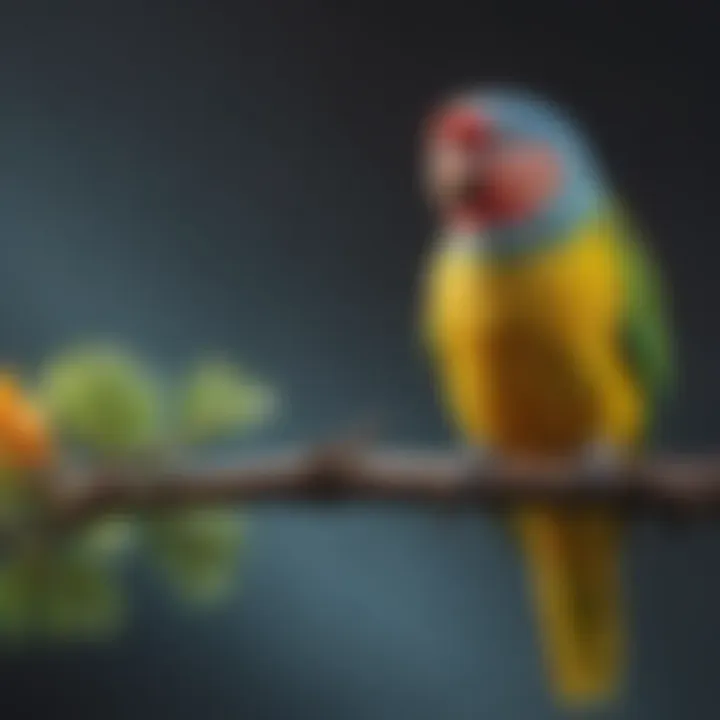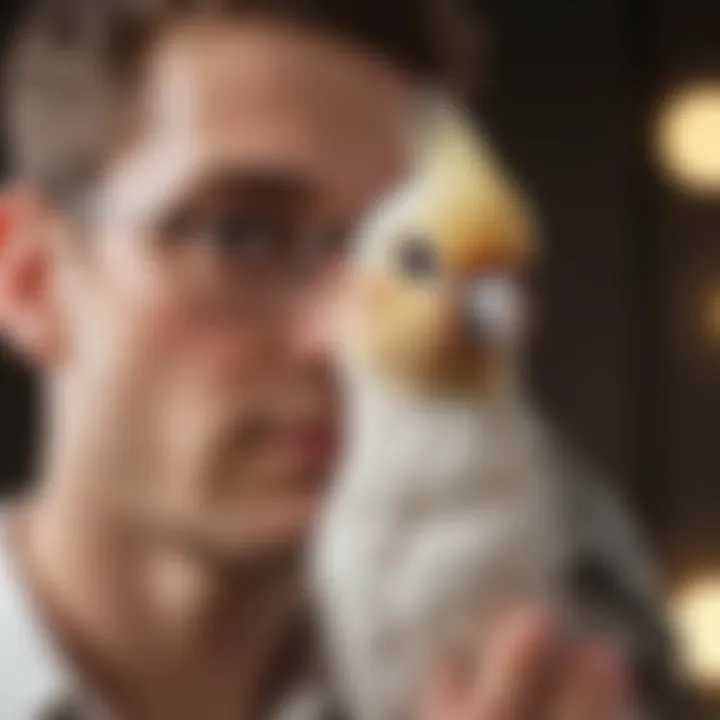The Best Pet Birds for Beginners: A Comprehensive Guide


Intro
Selecting a pet bird is no small decision. The right bird can profoundly enhance the experience of avian companionship. This narrative provides essential guidance, especially for first-time bird owners, on the qualities of various bird species. It lays the foundation for understanding care, temperament, and bonding practices. By the end, readers will grasp what it means to share their lives with these remarkable creatures, ensuring that their journey is both fulfilling and rewarding.
Care Tips
Taking care of a pet bird involves establishing daily routines that foster their health and happiness. A structured daily schedule helps both the bird and the owner. This schedule should include feeding times, play sessions, and interaction moments that nurture their well-being.
Daily Care Routines
Birds thrive on consistency. Create a daily care checklist that includes feeding, social interaction, and cleaning their space. A good practice is feeding birds in the morning when they are most active, followed by sessions of play and interaction to reinforce your bond.
Cage Setup and Maintenance
Choosing the right cage is crucial. The cage should be spacious enough for the bird to move around and stretch their wings. Ensure that it offers appropriate perches and toys. Maintain cleanliness by regularly cleaning food and water containers, and replacing soiled bedding to prevent health issues.
Hygiene and Cleaning Practices
Regular cleaning is essential for preventing illness. Remove uneaten food daily. Weekly, sanitize the cage with bird-safe cleaners, ensuring that all corners are addressed. A clean environment promotes a healthy bird.
Seasonal Care Adjustments
Birds may require different care during varying seasons. In the summer, ensure they have access to fresh water and shade. In colder months, consider alterations to their heated environment, as drafts can be harmful.
Behavioral Insights
Understanding bird behavior is fundamental for building a strong relationship. Familiarizing yourself with their body language can reveal their emotional states and needs.
Understanding Bird Body Language
Observe your bird's posture and movements. A well-content bird exhibits relaxed feathers. Fluffed feathers or aggressive movements may indicate discomfort or stress. Knowing these signals builds trust and communication.
Common Behavioral Issues and Solutions
Behavioral challenges often arise, especially in new environments. Birds may exhibit signs of boredom or frustration. Offer various toys and activities to redirect negative behavior.
Positive Reinforcement Techniques
Training should focus on positive reinforcement. Reward desired behavior with treats or affection. This approach strengthens your bond while encouraging good habits.
Social Interaction Needs
Birds are social creatures. Ensure they receive enough interaction daily, whether through talking, play, or training exercises. Social companionship can significantly enhance their happiness.
Nutrition Guides
A well-balanced diet is critical for a bird's health. Each species has specific dietary requirements that must be met to ensure optimal development.
Essential Diet Components
Most pet birds will benefit from a mix of pellets, fresh fruits, and vegetables. Research your specific bird's dietary preferences to create suitable meal plans.
Safe and Toxic Foods
While many foods are safe for birds, some are toxic. Avoid feeding them chocolate, caffeine, and certain fruits with pits, like cherries and avocados. Familiarize yourself with safe options to keep your bird healthy.
Supplements and Treats
Consider adding specific supplements based on your bird’s needs. Seeds can be healthy occasional treats but shouldn’t make up the bulk of their diet.
Feeding Strategies for Different Species
Different bird species have varied feeding preferences. Research which foods are best suited for your bird type. Adjustments might be necessary as they grow or if they develop specific health issues.
Wellness and Health
Routine health maintenance is essential. Bird owners must remain vigilant about potential health concerns.
Routine Health Checkups
Schedule annual vet visits to ensure your pet's continued health. Vets specializing in avian care can provide valuable insights and preventative checkups.
Identifying Symptoms of Illness
Learn to recognize signs of distress, such as changes in behavior, appetite, and vocalization. Early intervention is critical in maintaining their health.
Preventative Care and Vaccinations
Just like other pets, birds can also benefit from vaccinations. Discuss with your veterinarian about which ones are necessary for your bird.
Mental and Emotional Well-being
Birds are intelligent and sensitive. Regular stimulation through interaction and activities is vital for their mental health. Provide a variety of enrichment opportunities to keep them engaged.
Enriching Activities
Offering stimulating activities fosters a deeper bond between you and your bird.
Toys and Playtime Ideas
Incorporate a range of toys to keep your bird mentally active. Rotate toys periodically to sustain their interest.
Training and Tricks
Consider teaching your bird simple tricks. This not only entertains but also strengthens your relationship.
Outdoor Activities and Interaction
For birds that enjoy the outdoors, supervised outings can provide fresh experiences. Use secure harnesses for safety.
DIY Projects for Mental Stimulation
Making toys from safe household materials can save costs and provide stimulation for your bird. Engage in activities that allow for creativity while promoting interaction.
Understanding Pet Birds


Understanding pet birds is essential for anyone considering bringing a feathered companion into their home. This section delves into the key aspects of owning birds, emphasizing their unique appeal and specific care needs. Knowing these factors informs potential owners, aiding in selecting a bird that matches their lifestyle while ensuring a positive experience for both the human and the pet.
The Appeal of Companion Birds
Companion birds are increasingly favored for various reasons. They provide companionship and can form strong bonds with their owners. Often, their playful behaviors and vocalization skills bring joy and entertainment into daily life. Many birds also exhibit distinct personalities, making them intriguing to observe. The beauty of their feathers and charming appearances add to their appeal.
Additionally, birds often require less space than larger pets, making them suitable for apartment living. Birds like parakeets and canaries can thrive in small enclosures, as long as they have daily interaction and stimulation. Their relatively long lifespans mean owners may enjoy lasting relationships with their birds.
Why Choose a Bird as a Pet
Choosing a bird as a pet presents specific advantages over other types of pets. First, they often have lower maintenance demands compared to dogs or cats. Their dietary needs are straightforward, usually encompassing seeds, pellets, fruits, and vegetables. Proper care includes regular cleaning of cages and changing food and water daily.
Birds also offer unique opportunities for enrichment. They can learn to mimic sounds, engage in various activities, and even perform tricks. This intelligence makes the bond between bird and owner more interactive.
Furthermore, many people find that birds can be emotionally supportive companions. They respond to human emotions and can provide comfort during tough times. In essence, pet birds deliver companionship, entertainment, and comfort in ways that appeal to numerous individuals.
"A pet bird is not just a pet. It's a friend who occupies a special place in your life."
Evaluating these points highlights the rich experience awaiting those who choose to welcome a bird into their home. Understanding these elements ensures a responsible approach to pet ownership, leading to a rewarding relationship.
Criteria for Selecting a Beginner Bird
Selecting a pet bird is a significant decision that can influence the quality of life for both the bird and the owner. Understanding the criteria for choosing a beginner bird is essential. These criteria include temperament, size, space, and maintenance needs. Each of these elements plays a role in the overall ownership experience, ensuring that the bird adapts well to its new home.
This section aims to clarify why these factors are crucial. Choosing a bird that matches your lifestyle can lead to a more harmonious living situation. A good match minimizes stress and promotes a healthy bond between the owner and the bird. Prioritizing temperament, for instance, ensures you select a species that is friendly and easy to handle. Next, considering size and space helps in providing an adequate environment for the bird. Finally, understanding maintenance requirements prepares an owner for the day-to-day responsibilities.
Overall, knowing these criteria lays the groundwork for successful bird ownership. It ensures that the chosen bird species will meet the needs and expectations of the owner, resulting in a rewarding experience.
Temperament Considerations
The temperament of a bird is one of the most important aspects to consider. Different species exhibit varying levels of friendliness, sociability, and vocalization. For first-time owners, it is critical to choose a bird known for its gentle nature and willingness to interact with humans.
For example, parakeets are known for their playful and social behavior. They can develop strong bonds with their owners, making their companionship enjoyable. In contrast, some larger birds, like cockatoos, may require more social interaction and can be more demanding.
A bird that has a calm and affectionate temperament is more likely to thrive in a household with limited experience. They will adjust better and be less stressed, enhancing the initial bonding experience. Therefore, temperament should reflect the owner's ability to meet the bird's social and emotional needs.
Size and Space Requirements
When selecting a bird, size directly affects the care requirements and the living space needed. Smaller birds, like canaries and finches, typically require less space and are easier to manage. They can adapt well to a variety of living conditions, making them suitable for beginners.
However, understanding the size of the bird also involves consideration of its cage and environment. For instance, even though a budgerigar is small, it thrives in an adequately sized cage with room to fly.
Moreover, larger bird species, such as cockatiels, need more room to move and exercise. A spacious cage with proper bar spacing will provide safety and comfort. Thus, prospective owners should calculate available space in their homes, ensuring that the environment matches the needs of the bird.
Maintenance and Care Needs
The maintenance and care requirements of a bird should be a priority in the selection process. Pet birds require daily attention to their feeding, cleaning, and social interaction. Understanding the care needs of a bird is vital to ensuring its health and well-being.
For example:
- Feeding Essentials: Different species have unique dietary needs. Cockatiels may require a varied diet including pellets, seeds, and fresh fruits.
- Cleanliness: Regular cleaning of the cage and surroundings is necessary to prevent illness.
- Health Monitoring: Owners should routinely check for any signs of distress or illness.
By selecting bird species that align with the owner's maintenance capabilities, one can avoid potential problems down the line. Beginners are encouraged to choose species that require moderate care, allowing them to build confidence while learning about bird care.
Taking time to consider these criteria is essential to the success of the bird ownership experience. Choose wisely.
Popular Bird Species for Beginners
The selection of bird species is crucial for novice owners. Certain bird species offer easier care, friendlier personalities, and a more forgiving nature if mistakes are made. By knowing more about these common species, new bird owners can make an informed choice that aligns with their lifestyle and comfort level in caring for a fragile living being.
Parakeets
Overview
Parakeets, often called budgerigars or budgies, are small, colorful birds known for their gentle demeanor. Their vibrant plumage and playful nature make them a popular entry point into bird ownership. As a species, they are sociable and adaptable, which can ease the transition for beginner owners. Parakeets can bond closely with their owners and often mimic sounds, adding an interactive element to their charm. On the downside, they require interaction and mental stimulation to avoid becoming bored or stressed.
Care Requirements
Parakeets require specific care to thrive. They need a spacious cage, ample food, and clean water on a daily basis. Owners must focus on providing a balanced diet that includes seeds and pellets, supplemented with fresh fruits and vegetables. Regular cage cleaning is essential to ensure a hygienic environment. Their relatively low maintenance needs make them suitable for beginners, yet there is a commitment to ensure their well-being that cannot be ignored.
Behavioral Traits
The behavioral traits of parakeets include curiosity and playfulness. They tend to be social birds who enjoy companionship, whether from other birds or their human caregivers. Their ability to learn tricks and talk can be an entertaining aspect for owners. However, this trait also means that parakeets can become anxious if left alone for long periods. Understanding these behaviors helps new owners create a fulfilling environment for their feathered friends.
Canaries
Overview
Canaries are also popular among bird enthusiasts. Known for their beautiful singing ability, these small birds add a serene ambiance to any home. Their vibrant colors, ranging from bright yellow to deeper reds, attract many new owners. Unlike parakeets, canaries often thrive on their own but require a bit of attention to ensure they remain healthy. They require a peaceful setting and suitable cage spacing, making them a good option for beginner bird owners who may not be prepared for interactive engagement.
Care Requirements
Canaries mainly need a diet consisting of high-quality seed mix, along with fresh vegetables. Ensuring their cage is clean and providing adequate perches for exercise is significant for their health. Regular checks for their well-being and condition are necessary as neglect can lead to common health issues. While not as demanding as some species, caring for canaries does require a steady routine that new owners need to establish.
Behavioral Traits
Canaries are admired for their singing ability, which varies greatly between breeds. Many owners enjoy the relaxed nature of canaries, providing them with a calm environment enhances their life. They tend to be less interactive than parakeets, but their gentle singing can be very comforting. This makes them suitable for those who prefer to keep their interactions minimal but still want a pet that livens up their living space.
Cockatiels
Overview
Cockatiels are known for their charming crest and friendly demeanor. They can be affectionate, often forming strong bonds with their owners. This bird species is recognized for its intelligence and inclination to play. Their social nature makes them a favored choice, especially for beginner bird owners looking for a more engaging companion. However, their playful behavior can lead to mischief if not properly managed.
Care Requirements
Cockatiels require similar care to that of parakeets. A spacious cage, along with a varied diet that includes seeds, pellets, and fresh produce, is vital for their health. They also need daily interaction and time outside their cage for exercise. Owners should provide mental stimulation through toys. They are relatively low maintenance, but it is essential to offer them social interaction to keep their spirits high and avoid behavioral issues.
Behavioral Traits
The behavioral traits of cockatiels include their love of socialization and unique vocalizations. They often mimic sounds and can become quite vocal when they feel they are not getting enough attention. This trait makes them an interactive pet, posing both advantages—like entertainment—and challenges, as they may become noisy. Recognizing their social needs is key to ensuring a happy relationship with this species.
Finches
Overview
Finches are small, colorful birds known for their lively behavior. They are often seen in pairs or groups, offering an energetic display. These birds are low-maintenance compared to others, appealing to individuals new to bird ownership. They thrive in social settings, interacting with their companions rather than their human caregivers. This makes them suitable for people seeking birds that are delightful to watch but do not necessarily require hands-on interaction.


Care Requirements
Finches need a spacious cage that allows them to fly short distances. Their diet consists of high-quality seeds and occasional fresh fruits. Regular care, including cage cleaning and monitoring for health issues, is necessary but not overly demanding. They offer a less intensive care requirement, fitting for someone who has a busy lifestyle yet desires the joy of keeping birds.
Behavioral Traits
Finches are known for their lively and social nature. They engage in playful chasing and chirping, creating an enjoyable atmosphere in the home. Their behavior can be quite entertaining, especially when kept in pairs. However, this means they can become unsettled if kept alone for too long. New owners should aim to keep at least two together to ensure they remain happy and stimulated.
Less Common Yet Suitable Birds
While many people gravitate toward popular breeds like parakeets and cockatiels, there exists a group of less common but equally suitable birds for beginners. This section aims to bring attention to the characteristics, benefits, and considerations of these birds.
Choosing a less common bird can often lead to a richer experience of bird ownership. These birds may have distinct temperaments or care requirements that might be appealing to specific owners. Moreover, exploring less common species enhances one’s understanding of avian life and offers unique companionship opportunities. Understanding their special needs is crucial for new bird parents to foster a successful bond.
Lovebirds
Overview
Lovebirds are small parrots, known for their affectionate nature. Their vibrant colors and charming demeanor make them a delight for any owner. The defining characteristic is their strong bond with their human companions as well as with one another. This trait makes lovebirds an immensely rewarding choice for those who are eager to invest time in socialization and interaction. They thrive on companionship yet can also exhibit playful independence. This duality allows for a dynamic interaction, suitable for varied lifestyles.
Care Requirements
Caring for lovebirds requires attention to their social needs and environment. These birds need spacious cages that allow ample room for movement and play. A varied diet, rich in fruits, vegetables, and pellets, is vital to ensure their health. Regular health checks and maintaining clean living conditions are other significant aspects of care. While lovebirds are resilient, failing to meet their dietary or social needs can lead to behavioral problems. Therefore, ensuring their well-being can sometimes require more effort compared to conventional pets.
Behavioral Traits
Lovebirds are known for their playful and curious nature. Their behaviors include a range of activities such as chewing and playing with toys. Socially, they often show affection through snuggling and vocal interactions. Observing a lovebird’s behavior can be both entertaining and insightful. However, they can also develop strong attachments to their owners, which can make it challenging when introducing new pets or people. Awareness of this can help in managing expectations as a bird owner.
Budgerigar Varieties
Overview
Budgerigars, commonly known as budgies, are among the most popular pet birds worldwide. Their small size and friendly nature make them ideal for beginners. Budgies come in various colors and patterns, adding aesthetic variety to their appeal. This versatility, combined with their relative ease of care, positions them as a favorable option for novice bird owners. Many budgies can be taught to mimic phrases, which enhances the interactive aspect of keeping them as pets.
Care Requirements
In caring for budgerigars, owners should provide a well-designed cage that allows for wing flaps and enough space for exercise. A balanced diet that includes seeds, pellets, and fresh greens is essential. Regular social interaction is crucial, as budgies can become lonely. While they are less demanding than other species, the commitment to their social and health needs remains significant.
Additionally, budgies can adapt well to various living environments, which makes them suitable for many different types of households.
Behavioral Traits
Budgerigars are social birds that thrive on interaction with their owners. They are generally friendly and enjoy engaging in play. Their tendency to chatter can be joyous but may also create a noisy environment. Understanding their social nature allows owners to create enriching activities that keep them occupied. However, without sufficient interaction, budgies may develop behavioral issues like feather plucking. Thus, commitment to their social needs is a critical part of ownership.
Essential Supplies for New Bird Owners
Setting up your home for a new pet bird requires careful consideration and planning. The right supplies can greatly enhance the well-being of your feathered companion and make your experience more enjoyable. Caring for birds involves understanding their specific needs and the essential supplies that help meet these needs.
Cage Selection
The cage is the most critical element in the habitat of a pet bird. It should provide adequate space for your bird to move freely and comfortably. Each species has different size requirements, thus it’s essential to choose a cage that aligns with the specific bird type you are bringing home. For larger birds like cockatiels, a bigger cage is necessary compared to smaller birds like canaries.
The bars of the cage should be spaced appropriately to prevent escapes or accidents. For example, parakeets require a similar spacing to ensure they do not get their heads stuck. The material should also be safe; avoid cages with toxic finishes. Additionally, ensure that the cage is easy to clean, as this will make maintenance much simpler and help to keep your bird healthy.
Feeding Essentials
Birds have particular dietary needs that must be met to ensure their complete health. A quality bird seed mix specific to your bird species is a basic requirement. However, seeds alone are not sufficient. They require fresh fruits and vegetables to provide essential vitamins and minerals.
In addition to seeds and fresh produce, you should provide clean water daily. It is essential to use a suitable water dish that minimizes spillage and contamination. Also, consider investing in a proper food dish that can withstand their beak exploring and is easy to clean.
A balanced diet leads to a healthy bird. Always research the dietary needs specific to your bird species.
Perches and Toys
Birds need various perching options to keep them comfortable and engaged. Natural wood perches of different diameters allow them to exercise their feet and reduce pressure sores. Avoid perches made from harmful materials such as plastic or synthetic fibers.
Toys are vital for mental stimulation. Birds can become bored easily, leading to destructive behaviors. Provide toys that they can chew, swing on, and interact with. Change toys frequently to give them new challenges and keep their environment fresh.
In summary, investing in the proper essential supplies lays the foundation for a healthy, thriving pet bird. Be sure to prioritize quality and safety in every item you select, as this directly impacts the happiness and health of your avian friend.
Creating a Comfortable Environment
Creating a safe and enjoyable environment for pet birds is essential. Birds are sensitive creatures. Their comfort directly affects their well-being and behavior. A well-structured living space can lead to a happier, more content pet. Two major factors in this context are temperature and humidity control as well as noise levels. These components can significantly impact the health and happiness of your avian companion.
Temperature and Humidity Control
Temperature and humidity are fundamental for bird health. Most pet birds thrive in environments where the temperature remains between 65°F to 80°F. Extreme temperature changes can stress them. If they feel hot or cold, they may become lethargic or anxious.
Humidity levels also matter. Parakeets, canaries, and cockatiels prefer humidity in the range of 40% to 60%. Too dry air can lead to respiratory problems or dry skin. Conversely, high humidity can promote bacteria growth.
To maintain ideal conditions, monitor room temperature. Avoid placing the cage near drafts or direct sunlight. Using a thermometer can help track temperatures effectively. For humidity, a hygrometer can provide essential data. In addition, consider a humidifier if your home is dry, or a dehumidifier for very humid areas. Regularly observe your bird’s behavior as signals of discomfort.
Noise Levels
Birds are naturally vocal animals. However, excessive noise can stress them. A noisy environment can lead to anxiety and fear. Therefore, it’s critical to consider how loud activities around the bird will impact its comfort.
Keeping pet birds in a calm area of the home is advisable. Loud music, yelling, or barking dogs can create tension. Birds may try to escape stress by hiding or becoming aggressive. It’s best to place the cage in a location where the noise levels are manageable.
Additionally, allow time for your bird to adjust to its surroundings. New environments may be overwhelming. Provide a quiet space where the bird can feel secure. Gradually introduce new sounds, so your pet can acclimatize without feeling threatened.
Keeping pet birds in a calm environment can enhance their overall mood and foster a healthy relationship between the owner and the bird.
By focusing on these aspects, you can foster a supportive environment for your pet. A comfortable home leads to a happy bird, which in turn contributes to a strong bond with its owner.
Nutrition for Pet Birds
Proper nutrition is crucial for the wellbeing of pet birds. An adequate diet supports various bodily functions, enhances energy levels, and contributes to a longer, healthier life for your avian companion. Each species may have unique dietary needs, but understanding the basic principles can significantly aid in providing a balanced diet that meets their needs.
Basic Dietary Needs
Birds require a varied diet to ensure they receive all necessary nutrients. This generally includes a mix of seeds, pellets, fruits, and vegetables.
- Seeds: While seeds can be part of a bird's diet, they should not be the primary component. They are often high in fat and low in essential vitamins and minerals.
- Pellets: High-quality pellets can offer balanced nutrition. They contain a range of nutrients designed for specific species, helping to reduce dietary imbalances.
- Fruits and Vegetables: Fresh produce should be included daily, as it provides vitamins, minerals, and hydration. Leafy greens like kale and fruits like apples are often favored.
A varied diet is key to preventing nutrition-related health issues in pet birds.


Types of Feed
When selecting feed for your pet bird, it's important to choose type based on their specific needs. The three categories mentioned earlier provide a foundational understanding of what can be included in their diet:
- Seed Mixes: These can be enticing for many birds and provide a favored element, but ensure you choose a mix appropriate for your bird.
- Pelleted Diets: Brands such as Harrison's and Kaytee offer quality options. They are formulated with birds' needs in mind, making them an excellent choice for a staple diet.
- Fresh Foods: It is essential to incorporate fresh foods in your bird's diet. Offer a mix of colorful fruits and vegetables. Avoid toxic foods such as avocado and chocolate.
Supplements
In some cases, birds may benefit from dietary supplements to fill any nutritional gaps. Here are a few types commonly used:
- Multivitamin Supplements: These can help ensure that your bird receives vital nutrients that may be lacking in their primary diet.
- Calcium Supplements: Especially important for breeding females or birds on a pellet diet, calcium can support healthy bone development and egg production.
- Probiotics: These can support digestive health, especially after any illness.
Being attentive to your bird's dietary needs will help maintain their health. Regularly monitor their eating habits. Adjustments may be necessary based on their growth, metabolism, and activity levels.
Understanding Bird Behavior
Understanding bird behavior is crucial for anyone considering a pet bird. It helps new owners create an environment that caters to their avian companions' needs. Birds exhibit a range of behaviors that can reveal their emotional state, social needs, and overall health. Knowing these specifics allows for better care and deeper bonds with pets. Furthermore, recognizing behavioral patterns improves communication, making interactions more meaningful and satisfying.
Common Behaviors of Pet Birds
Pet birds display several common behaviors that reflect their personality and needs. These behaviors include:
- Vocalizations: Birds often communicate through chirps, whistles, and other sounds. The type and frequency of vocalizations can indicate their mood. For instance, a sudden increase in loud calls may suggest excitement or stress.
- Preening: Regular grooming is essential for birds. It keeps their feathers clean and healthy. Watching a bird preen can be a sign of comfort, as well-groomed birds often show they feel secure in their environment.
- Exploring: Birds are naturally curious creatures. Providing opportunities for exploration, such as safe perches and toys, is essential for mental stimulation. This behavior also prevents boredom, which can lead to stress and health issues.
- Social Interactions: Birds are social animals. They usually enjoy the company of other birds or humans. Observing how a bird interacts with its surroundings can provide insights into its social needs and preferences.
These behaviors not only enhance the bird's quality of life but also enrich the owner's experience.
Recognizing Stress Signals
Identifying stress signals in pet birds is vital for early intervention. Birds may exhibit various signs when they are feeling stressed. Some common indicators include:
- Feather Plucking: Unexplained feather loss may signal anxiety or discomfort. This behavior often needs immediate attention to prevent further harm and to address underlying causes.
- Aggression: Sudden changes in behavior, such as biting or excessive vocalizations, indicate distress or territorial issues. Understanding the triggers can help mitigate these reactions.
- Hiding: A bird that frequently retreats to a corner or a cage may be experiencing anxiety. This behavior signifies a need for a calm, safe space to relax.
- Change in Eating Habits: Loss of appetite or changes in diet can be a clear sign of stress or illness. Monitoring feeding patterns ensures that owners can respond to any potential issues promptly.
Recognizing these signals will facilitate timely actions, ensuring well-being and a balanced environment for pet birds.
Being attentive to these behaviors is essential for fostering a healthy relationship. Owners who understand their bird’s stress signals can help alleviate discomfort, contributing to a more enjoyable pet ownership experience.
Health and Wellness Considerations
The health and wellness of pet birds is crucial for their longevity and happiness. A well-cared-for bird is not only a source of joy but also a reflection of the owner's commitment to responsible pet ownership. Regular health checkups, understanding common ailments, and knowing how to choose a qualified veterinarian, all play a vital role in maintaining the overall well-being of your avian companion.
Benefits of Prioritizing Bird Health
Investing time in health considerations yields multifaceted benefits. Healthy birds display vibrant colors, demonstrate active behaviors, and engage more with their surroundings. Additionally, understanding the signs of illness helps detect problems early, potentially avoiding serious complications. Protecting your bird's well-being also fosters a deeper bond between the bird and owner.
Routine care includes proper nutrition, mental stimulation, and, importantly, regular visits to the veterinarian. By establishing routines that emphasize wellness, bird owners contribute to a more fulfilling partnership.
"A healthy bird is a happy bird."
Routine Health Checks
Routine health checks for pet birds are essential to ensure they remain in good shape. These checks might involve observing behaviors, monitoring dietary habits, and inspecting physical appearance. It’s advisable to conduct weekly checks, focusing on signs of illness such as ruffled feathers, lethargy, or changes in droppings.
A detailed observation can be simple. Take note of your bird's activity levels, eating habits, and interactions. Schedule annual checkups with your veterinarian. These appointments allow for vaccinations and general assessments. A vet can also recommend specific tests based on the bird's species and age, ensuring it receives tailor-fitted care.
Common Health Issues
Understanding common health issues is key for early detection and management. Birds can face a variety of health concerns, but some are more prevalent. Here are a few examples:
- Respiratory infections: Symptoms may include wheezing, coughing, or difficulty breathing.
- Psittacosis: A bacterial infection that can affect both birds and humans, manifesting through lethargy and changes in droppings.
- Obesity: Overweight birds may encounter mobility issues and decreased lifespan. Proper feeding practices and exercise are essential.
- Feather plucking: Often linked to stress or boredom, this behavior can indicate underlying issues requiring attention.
Awareness of these common ailments allows bird owners to act quickly, possibly preventing severe health deterioration.
Choosing a Veterinarian
Selecting the right veterinarian is a significant step for any bird owner. Not all veterinary professionals specialize in avian care. Therefore, look for a vet who possesses knowledge specific to bird health. Referrals from local bird clubs or online platforms, including forums on Reddit, are excellent starting points.
During the initial visit, assess the veterinarian's willingness to address concerns and their expertise in dealing with avian species. An ideal veterinarian also understands the unique behaviors and needs of different bird types, providing a comprehensive approach to care.
Additionally, consider proximity and emergency services offered. In emergencies, swift access to care can be crucial. A vet who can accommodate after-hours care is invaluable in a crisis.
By prioritizing health and wellness, pet bird owners can contribute significantly to their companion's quality of life, making informed decisions that enhance well-being.
Training and Socialization Tips
Training and socialization are fundamental aspects of nurturing a well-adjusted pet bird. These practices help in developing a strong bond between the bird and its owner. Moreover, they can significantly reduce stress for both parties involved. Birds that are well trained tend to be more confident and interactive, leading to a better companionship experience.
Socialization extends beyond basic training. It involves exposing the bird to different environments, people, and other pets. During this process, the bird learns to adapt and feel safe, enhancing its overall well-being. Therefore, focusing on training and socialization from an early stage is crucial.
Basic Commands
Teaching basic commands to pet birds is an effective way to establish communication. Commands such as "step up" or "come here" encourage interaction and build trust.
When introducing commands, consistency is vital. Use the same phrase, tone, and hand signal each time. You can start with:
- Step Up: This command helps the bird to learn to step onto your hand or finger. Start by placing your finger in front of your bird and gently press the bird's belly. When it steps on your finger, reward it with a treat.
- Come Here: This command encourages the bird to move towards you. Practice this in a safe space. Hold the bird's favorite treat, call it, and reward it when it approaches.
Repeated practice will facilitate this learning process. However, be patient, as birds take time to adapt. Positive reinforcement through treats and praise is effective in building successful habits.
Socializing with Other Pets
Birds can often coexist peacefully with other pets, but this requires careful introductions and monitoring. The key is to manage interactions positively to ensure safety for both the bird and other animals.
Start by allowing the bird to observe other pets from a safe distance. This helps it acclimate without feeling threatened. Gradually bring the bird closer, but only if it appears relaxed. Always supervise these interactions closely, as even well-meaning pets can cause stress or harm.
Important points to consider when socializing a bird with other pets:
- Controlled Environment: Limit the interaction area to avoid overwhelming the bird.
- Gradual Introduction: Slowly increase interaction time with other pets.
- Observe Behavioral Signals: Look for signs of comfort or stress, such as calmness vs. puffed feathers.
By following these guidelines, you can create a peaceful environment for your bird and other pets. Socialization aids in creating a harmonious household and contributes to overall well-being.
End
Understanding the significance of pet bird ownership is essential not only for new owners but also for those contemplating adding a feathered companion to their lives. The conclusion of this article provides valuable insights into the key aspects discussed, emphasizing the importance of careful consideration and informed decision-making when selecting a pet bird. It is a reminder of the bond that can develop between humans and birds, a relationship distinct in many ways from traditional pet ownership.
Final Thoughts on Pet Bird Ownership
Pet bird ownership is a unique journey that blends joy, companionship, and responsibility. This article has detailed the various bird species suitable for beginners, highlighting their specific temperaments and care needs.
Engaging with a pet bird can enrich one’s life immensely. Owners have the opportunity to witness their bird's unique personality unfold, from their playful antics to their communication skills. Each bird species also brings different challenges and rewards, necessitating a considerate selection process.
Maintaining a pet bird involves not just providing food and a safe living environment, but also understanding their behavioral cues and health requirements. Regular interactions and socialization can reduce stress for the bird and enhance the bond with its owner.
The commitment to a pet bird's well-being includes regular veterinary care, a suitable diet, and an enriching environment.
In summary, successful pet bird ownership demands dedication, knowledge, and a readiness to adapt to the bird's needs. As individuals embark on this journey, staying informed and nurturing the partnership is crucial to a fulfilling experience.















